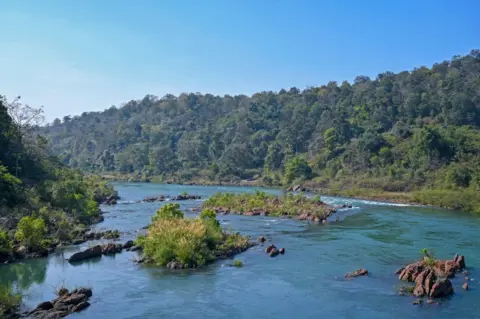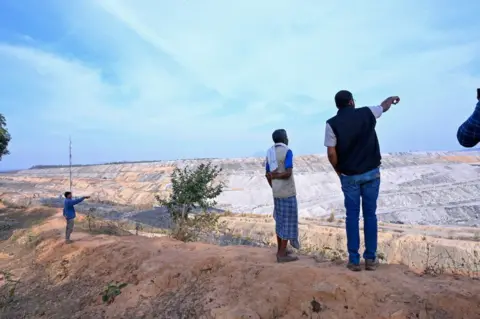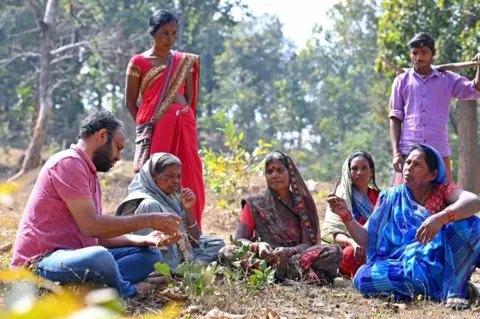Man who took on coal industry to save forest - and won
BBC carries an article about 43-year-old Alok Shukla who dedicated his life to stopping the multi-billion dollar companies hoping to uproot forest in search of the coal beneath its soil, Caliber.Az reprints the article.
The moment Alok Shukla first saw the forest in central India stretching out before him, he knew two things instantly.
One: that this forest - known as the lungs of Chhattisgarh, home to thousands of tribespeople, endangered animals and rare plants - was one of the most beautiful places he had ever seen.
And two: that he would dedicate his life to stopping the multi-billion dollar companies hoping to uproot it in search of the coal beneath its soil.
The only question was, how?
Twelve years later, Alok can smile at the memory. After all, what he has achieved in the intervening years has been impressive.
On Monday, the 43-year-old was awarded the Goldman Environmental Prize, otherwise known as the green Nobel.
But it started with small steps.
Back in 2012, the Hasdeo Aranya forest in Chhattisgarh state and its 657 bio-diversity rich square miles (1,071km sq) were under threat, thanks to its massive coal deposits - totalling an estimated 5.6 billion tonnes.
In India, the world's second largest consumer of coal after China, those deposits are a highly valuable commodity.

But the value to the tribespeople - known collectively as the Adivasi - and the animals like elephants, sloth bears, leopards and wolves, not to mention the tigers which use it as a corridor between habitats, or the birds which live in the trees, was incalculable to Alok.
He wasn't the only one to recognise the value of the land: local authorities had declared it protected a few years earlier - although this was never formal.
Despite this, so-called coal blocks in the forest were put up for auction. The powerful multinational Adani group would apply to build five mines in the area between 2010 and 2015. More companies, and more mines, would follow.
"I still vividly remember the day I went there," Alok says. "It's such a beautiful forest - and unfortunately that forest is going to be destroyed by coal mining.
"But much worse than that, the local tribal communities there who have been conserving the forest for centuries - they're not even aware of what the impacts of mining would be... or what the legal provisions and protections [are that would help them save it]."
The loss of their traditional home, Alok feared, would be devastating.
"The Adivasis have been living there for several centuries. They know nothing else, but these forests. It's part of their identity."

And they were already trying to fight back - the problem was, each village was fighting alone.
Alok realised they were doomed to lose the battle unless everyone came together. Two mines had already begun production because the resistance had failed.
"It's not just a fight for one village in fact, it's a fight for the entire region," he says.
Out of this, the Save Hasdeo Aranya Resistance Committee - an informal alliance of grassroots movements - grew, teaching people about the local laws and rights available. It also linked the different groups together effectively for the first time.
But it wasn't easy. In 2020, more coal mines were proposed.
With Covid racing across India, Alok once again began organising.
Community pressure led to three of the mines being shelved that September. The next month, the community fought to have almost a million acres designated as an elephant reserve.
Then central government stepped in to push forward plans to auction off 21 coal blocks under emergency provisions.

It would take another 18 months - along with an online campaign united under the hashtag #SaveHasdeo, a march on the state capital, and even a tree hugging sit-in - for the 21 coal blocks to finally be cancelled.
None of it has been easy. The 12-year battle, he admits, has taken a steely resolve on his part, and on the part of the forest communities.
"This is a fight in some sense between the people's lives and livelihoods and forests on the one hand, and the corporate profits on the other hand," he explains.
"Naturally any company whose profits and viability is at stake will try to do all kinds of steps to make sure that they get the land."
And even now, there are still fights to be won - land which needs to be rejuvenated after being destroyed and trees which are still in danger.
Alok hopes winning the Goldman prize, which recognises a handful of grassroots campaigners from around the world each year, will inspire other movements globally - and once again focus attention on the forest.
"Any tree being cut in Hasdeo Aranya is wrong, and our effort will be to save every tree," he vows.








